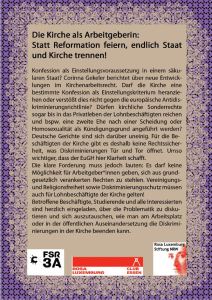An der Universität Duisburg-Essen – Capus Essen – findet eine interessante Veranstaltung zu arbeitsrechtlichen Fragen der Kirche als Arbeitgeberin statt. Corinna Gekeler wird einen Vortrag halten zum Thema „Darf die Kirche als Arbeitgeberin diskriminieren?“, anschließend findet eine Diskussion statt.
- Wann: Montag, den 11.12.2017, 19 Uhr
- Wo: Campus Essen der Universität Duisburg-Essen, Raum S06 S00 B29
Weitere Informationen hier: http://www.rlc-essen.de/2017/11/vortrag-und-diskussion-darf-die-kirche-diskriminieren/


